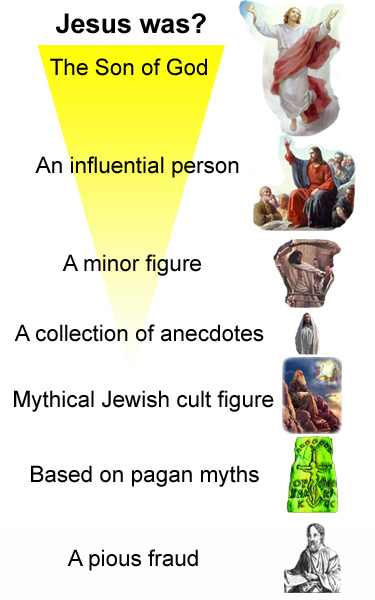
 |
Freethought & Rationalism ArchiveThe archives are read only. |
|
|
#31 | ||
|
Banned
Join Date: Dec 2007
Location: USA
Posts: 425
|
Quote:
Quote:
|
||
|
|
|
|
#32 | |||
|
Contributor
Join Date: Sep 2002
Location: MT
Posts: 10,656
|
Quote:
|
|||
|
|
|
|
#33 | |||
|
Contributor
Join Date: Jun 2000
Location: Los Angeles area
Posts: 40,549
|
Quote:
What is facially absurb about the idea of a religion starting around a mythical spirit? Quote:
Quote:
|
|||
|
|
|
|
#34 | ||
|
Contributor
Join Date: Sep 2002
Location: MT
Posts: 10,656
|
Quote:
|
||
|
|
|
|
#35 | |
|
Contributor
Join Date: Mar 2004
Location: Dallas, TX
Posts: 11,525
|
Quote:
If it were actually true that no qualified scholars were mythicists, you might have a point, but that simply isn't true. edit: my very intermittent memory actually got this one right. Here is PhilosopherJay's list: http://www.freeratio.org/showpost.ph...4&postcount=45 |
|
|
|
|
|
#36 | ||
|
Contributor
Join Date: Sep 2002
Location: MT
Posts: 10,656
|
Quote:
http://www.freeratio.org/showpost.ph...&postcount=149 I think Robert M. Price and Richard Carrier may be the only modern fully-qualified individuals. G.A. Wells would be a modern at-least pseudo-qualified person. There are some fully-qualified people from 100 years ago, like Arthur Drews. The rest of the list seems to be people fully qualified in something else entirely, or just popular authors and leaders of anti-religious activism. I didn't mean to imply that there are no experts who accept mythicism. There are a few. Like I said, mythicism is nothing unusual in the way of fringe theories. |
||
|
|
|
|
#37 | |
|
Contributor
Join Date: Mar 2004
Location: Dallas, TX
Posts: 11,525
|
Quote:
Robert M. Price, Peter Gandy, Herman Detering, Darrell Doughty, Tom Harpur, Michael O. Wise, Burton Mack, Richard Carrier. I have not checked everyone on the list, nor is the list necessarily complete. I'm guessing that for every famous well qualified mythicist, there are at least a dozen well qualified mythicists that that we haven't heard of. |
|
|
|
|
|
#38 | ||
|
Contributor
Join Date: Sep 2002
Location: MT
Posts: 10,656
|
Quote:
|
||
|
|
|
|
#39 |
|
Contributor
Join Date: Jun 2000
Location: Los Angeles area
Posts: 40,549
|
|
|
|
|
|
#40 | |
|
Contributor
Join Date: Mar 2006
Location: Falls Creek, Oz.
Posts: 11,192
|
Jesus Myth Spectrum
The range of views about Jesus can perhaps be presented on a spectrum as follows:  The Gospels as a Pious Fraud Quote:
|
|
|
|
| Thread Tools | Search this Thread |
|